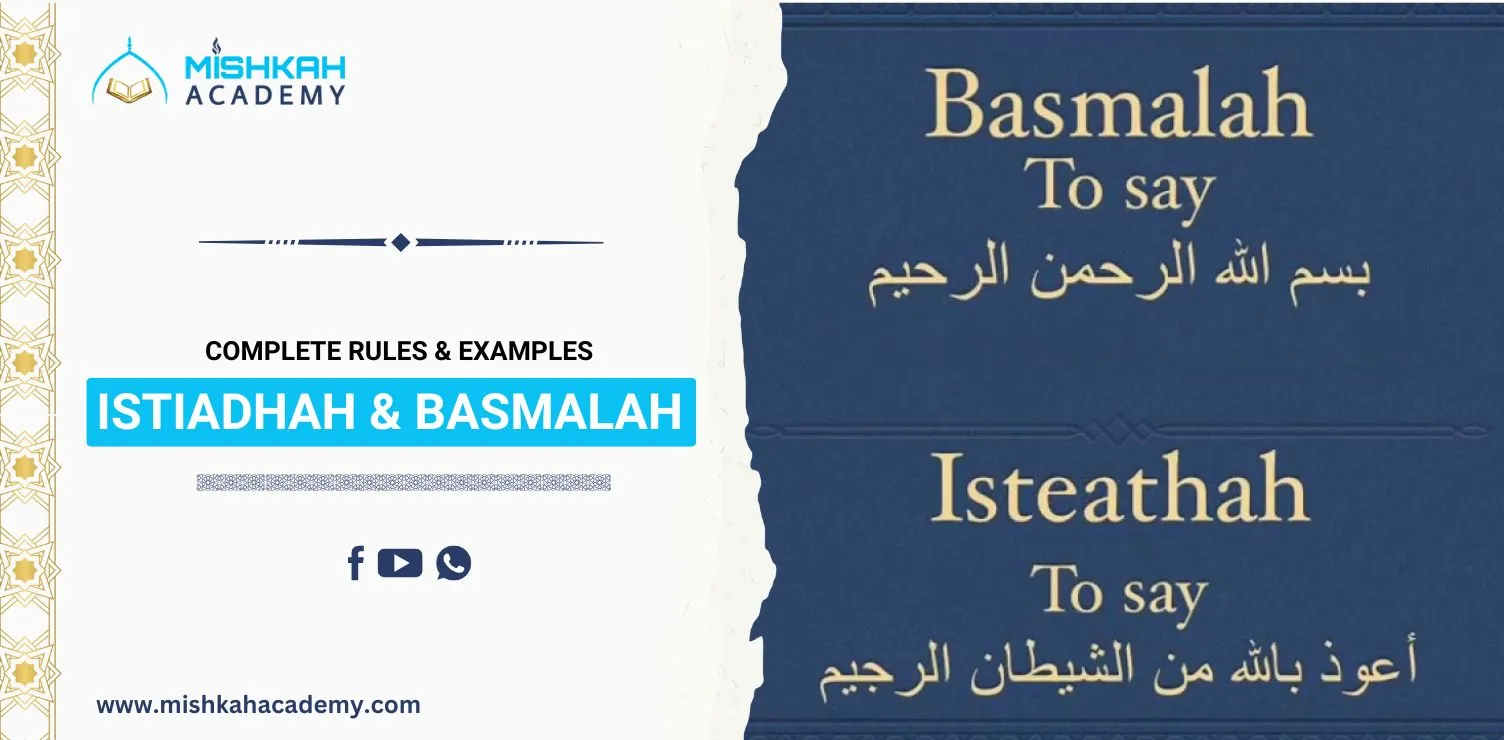Before reciting any part of the Quran, a reciter must be versed with two key phrases in the art of Tajweed, which is the science of correct Quranic recitation. These are Al-Basmalah (البسملة) and Al-Isti’aathah (الاستعاذة). These two lines have significant meaning in Islamic ceremony, Quranic recitation, and spiritual activities; they are not simply introductory words.
Definition of Al-Isti’aathah
Table of Contents
ToggleThe act of seeking refuge with Allah from the damned Shaytaan is known as al-Isti’aathah (الاستعاذة). The root word “a-w-dh” (عوذ), which meaning to seek refuge or protection, is where it originates. The entire statement that was recited is:
أَعُوذُ بِاللَّهِ مِنَ الشَّيْطَانِ الرَّجِيمِ
“A‘oothu billahi min ash-shaytaan ir-rajeem”
Translation: “I seek refuge in Allah from the accursed Shaytaan.”
Purpose of Al-Isti’aathah
While performing an act as sacred as reciting the Quran, the goal of Isti’aathah is to ask Allah to protect you from the whispers and interruptions of Shaytaan. By reciting this verse, one admits that they require Allah’s defense against the a deterrent implication, and harmful ideas that Shaytaan might create. It represents a condition of spiritual humility and surrender where one asks Allah to protect one’s heart and mind.
Definition of Al-Basmalah
Al-Basmalah (البسملة) is the phrase that begins with the words:
بِسْمِ ٱللَّهِ ٱلرَّحْمَـٰنِ ٱلرَّحِيمِ
“Bismillah ir-Rahman ir-Raheem”
Translation: “In the name of Allah, the Most Merciful, the Most Compassionate.”
This phrase is considered to be of great importance in the life of every Muslim and is recited at the start of most significant tasks or acts of worship.
Importance of Al-Isti’aathah and Al-Basmalah
Al-Isti’aathah and Al-Basmalah are important components in reciting the Quran. Their importance stems from the teachings of the Quran and the Prophet Muhammad’s (ﷺ) Sunnah. According to Surah An-Nahl (16:98), Allah commands:
“So when you recite the Quran, seek refuge with Allah from Shaytaan, the accursed.”
The istiadhah means “seeking refuge in Allah.” It prepares our heart and mind for reading the Quran. It shows we need Allah’s protection and guidance.
The basmalah starts with “In the name of Allah, the Most Gracious, the Most Merciful.” It sets the tone for reading. It reminds us of Allah’s kindness and our need for His blessing.
Together, the istiadhah and basmalah are the base for respectful Quran reading. They help us read with the right heart and mind. This way, we connect more deeply with Allah and understand the Quran better.
Furthermore, the Prophet Muhammad (ﷺ) frequently opened his actions and recitations with Al-Basmalah, stressing its significance for sustaining attention, receiving blessings, and succeeding in one’s efforts.
Key Takeaways
- Understand the significance of Istiadhah and Basmalah in Quran recitation.
- Explore the historical background and meaning of these important phrases.
- Learn the proper recitation and incorporation of Istiadhah and Basmalah in Tajweed Quran.
- Enhance your spiritual connection with the Quran through the understanding of Istiadhah and Basmalah.
Discover the educational resources available, such as the Mishkah Academy Tajweed Quran course, to deepen your knowledge.
Start Your Quran Journey NowHistorical Background of Basmalah
The Basmalah has a deep history in Islam. It started with the Prophet Muhammad (peace be upon him). He used it to ask for Allah’s blessing and guidance.
Today, the Basmalah is a symbol of the Islamic faith. It shows a person’s belief and submission to Allah’s will.
In the Quran, the Basmalah is a recurring theme. Scholars study its meaning and symbolism. It reflects Islam’s belief in Allah’s unity and mercy.
Muslims often say the Basmalah before starting important tasks. It’s a way to seek Allah’s blessing and protection. This practice adds a spiritual layer to daily activities.
The Basmalah holds great importance for Muslims. It reminds them of Islam’s core beliefs. By saying the Basmalah, Muslims connect with the divine and follow Allah’s will.
Rules of Isti’aatha and Basmalah in Tajweed
There are particular norms and regulations for reciting Isti’aathah and Basmalah in Tajweed, particularly when switching between Al-Isti’aathah, Al-Basmalah, and the actual Quranic verses. There are four main quran recitation rules to be mindful of:
Reciting Al-Isti’aathah, stopping, reciting Al-Basmalah, pausing again, and finally reading the poem is known as
1. Cutting off All Three(قطع الجميع)
For instance:
أعوذ بالله من الشيطان الرجيم. (pause)
بسم الله الرحمن الرحيم. (pause)
الحمد لله رب العالمين
This method allows the reciter to make a clear distinction between the phrases and the actual recitation of the verse.
2. Connecting All Three (وصل الجميع)
This involves connecting Al-Isti’aathah, Al-Basmalah, and the verse in one continuous recitation without pausing. For example:
أعوذ بالله من الشيطان الرجيم بسم الله الرحمن الرحيم الحمد لله رب العالمين
3. Connecting Al-Isti’aathah and Al-Basmalah, Cutting Off Before the Verse (وصل الاستعاذة بالبسملة وقطع قبل الآية)
In this method, the reciter connects Al-Isti’aathah and Al-Basmalah, but pauses before reciting the verse. For example:
أعوذ بالله من الشيطان الرجيم بسم الله الرحمن الرحيم. (pause)
الحمد لله رب العالمين
4. Cutting Al-Isti’aathah and Connecting Al-Basmalah with the Verse (قطع الاستعاذة ووصل البسملة بالآية)
In this method, the reciter pauses after Al-Isti’aathah, then connects Al-Basmalah with the verse without pausing. For example:
أعوذ بالله من الشيطان الرجيم. (pause)
بسم الله الرحمن الرحيم الحمد لله رب العالمين
Rules When Reciting Al-Isti’aathah and Al-Basmalah in Surah Al-Tawbah
One of the unique characteristics of
Surah Al-Tawbah (Surah 9) is that it does not begin with Al-Basmalah. When transitioning from another Surah to Surah Al-Tawbah, the reciter must adhere to the following rule:
The reciter should refrain from reciting Al-Basmalah if the recitation is being resumed or continued from the conclusion of the previous Surah to Surah Al-Tawbah. Rather, the opening verse of Surah Al-Tawbah need to be closely linked to the recitation of Al-Isti’aathah.
Different Types of Isti’aathah
There are different authentic forms of Al-Isti’aathah derived from the Quran and the Sunnah of the Prophet Muhammad (ﷺ). These variations may be used interchangeably based on personal preference or specific circumstances. Here are some of the notable types:
1. Standard Isti’aathah (الاستعاذة القياسية)
أَعُوذُ بِاللَّهِ مِنَ الشَّيْطَانِ الرَّجِيمِ
“A‘oothu billahi min ash-shaytaan ir-rajeem.”
Translation: “I seek refuge in Allah from the accursed Shaytaan”.
This is the most common form and the one recited by most Muslims before beginning the recitation of the Quran.
2. Extended Isti’aathah with Asma’ Allah (الاستعاذة الممتدة بأسماء الله)
أَعُوذُ بِاللَّهِ السَّمِيعِ الْعَلِيمِ مِنَ الشَّيْطَانِ الرَّجِيمِ
Translation: “I seek refuge in Allah, the All-Hearing, the All-Knowing, from the accursed Shaytaan.”
This form includes two of Allah’s beautiful names (As-Samee‘ – the All-Hearing, and Al-‘Aleem – the All-Knowing). It emphasizes the recognition of Allah’s attributes while seeking His protection.
3. Comprehensive Isti’aathah (الاستعاذة الشاملة)
أَعُوذُ بِاللَّهِ مِنَ الشَّيْطَانِ الرَّجِيمِ مِنْ هَمْزِهِ وَنَفْخِهِ وَنَفْثِهِ
Translation: “I seek refuge in Allah from the accursed Shaytaan, from his instigations, his arrogance, and his misleading inspirations.”
This form seeks protection not only from Shaytaan himself but also from his various forms of deceit and whisperings.
4. Isti’aathah with Affirmation of Allah’s Power (الاستعاذة بالتأكيد على قدرة الله)
أَعُوذُ بِكَلِمَاتِ اللهِ التَّامَّاتِ مِنْ شَرِّ مَا خَلَقَ
Translation: “I seek refuge in the perfect words of Allah from the evil of what He has created.”
This form emphasizes the reciter’s reliance on the powerful and complete words of Allah for protection against all forms of evil.
5. Prophetic Isti’aathah (الاستعاذة النبوية)
اللَّهُمَّ إِنِّي أَعُوذُ بِكَ مِنَ الشَّيْطَانِ الرَّجِيمِ وَهَمَزَاتِهِ وَأَعُوذُ بِكَ رَبِّ أَنْ يَحْضُرُونِ
Translation: “O Allah, I seek refuge in You from Shaytaan, the accursed, and from his instigations. I seek refuge in You, my Lord, from his presence around me.”
This form was reported as a dua of the Prophet Muhammad (ﷺ) and conveys a comprehensive plea for protection from Shaytaan’s influences and presence.
Benefits and Rewards of Reciting Al-Isti’aathah and Al-Basmalah
Spiritual Advantages
- Protection from Shaytaan: By reciting Al-Isti’aathah, one asks Allah to protect them from Shaytaan, which increases their level of spiritual attention and mindfulness.
- Blessings and Ease: By invoking Allah’s mercy and blessings through the recitation of Al-Basmalah, chores can be completed with ease and divine support.
- Recognition of Allah’s Mercy: Al-Basmalah strengthens the reciter’s humility and thankfulness by reminding them of Allah’s kindness and compassion.
Quranic Rewards
- The Prophet Muhammad (ﷺ) is said to have started his recitations with Al-Isti’aathah and Al-Basmalah, according to trustworthy Ahadith, and those who do the same would receive the appropriate rewards.
- With the exception of Surah Al-Tawbah, al-Basmalah is considered a unique verse at the start of every Surah. Since every verse of the Quran has great merit, reciting it as such improves the reciter’s benefit.
Examples of Reciting Al-Isti’aathah and Al-Basmalah in Context
- Recitation at the Start of the Quran: Depending on the previously mentioned guidelines, a reciter beginning with Surah Al-Fatiha may decide to join or divide the recitation of Al-Isti’aathah, Al-Basmalah, and the verse.
- Transitioning Between Surahs: Al-Basmalah should be connected or separated in accordance with the relevant Tajweed rules criteria while moving from the conclusion of one Surah to the next. For example, the reciter may connect or separate in accordance with Surah Al-Baqarah if it continues after Surah Al-Fatiha.
- Surah Al-Tawbah Omitting Al-Basmalah: The reciter must recite Al-Isti’aathah first, followed immediately by the Surah’s opening verse, before beginning Surah Al-Tawbah.
Conclusion
To sum up, *Al-Isti’aathah* and *Al-Basmalah* are fundamental components of *Tajweed* and have profound spiritual meaning when reciting the Quran. Prior to beginning any act of worship, *Al-Basmalah* asks Allah for mercy and blessings, while *Al-Isti’aathah* seeks protection from the accursed Shaytaan, guaranteeing the reciter’s focus and sincerity. The recitation experience is enhanced and brought into line with the teachings of the Prophet Muhammad (ﷺ) when one is aware of the various types and norms of these phrases. A reciter can preserve the sanctity and accuracy of Quranic recitation by following these rules, which will lead to spiritual benefits and a closer relationship with Allah’s divine words.
Start Your Quran Journey Now





